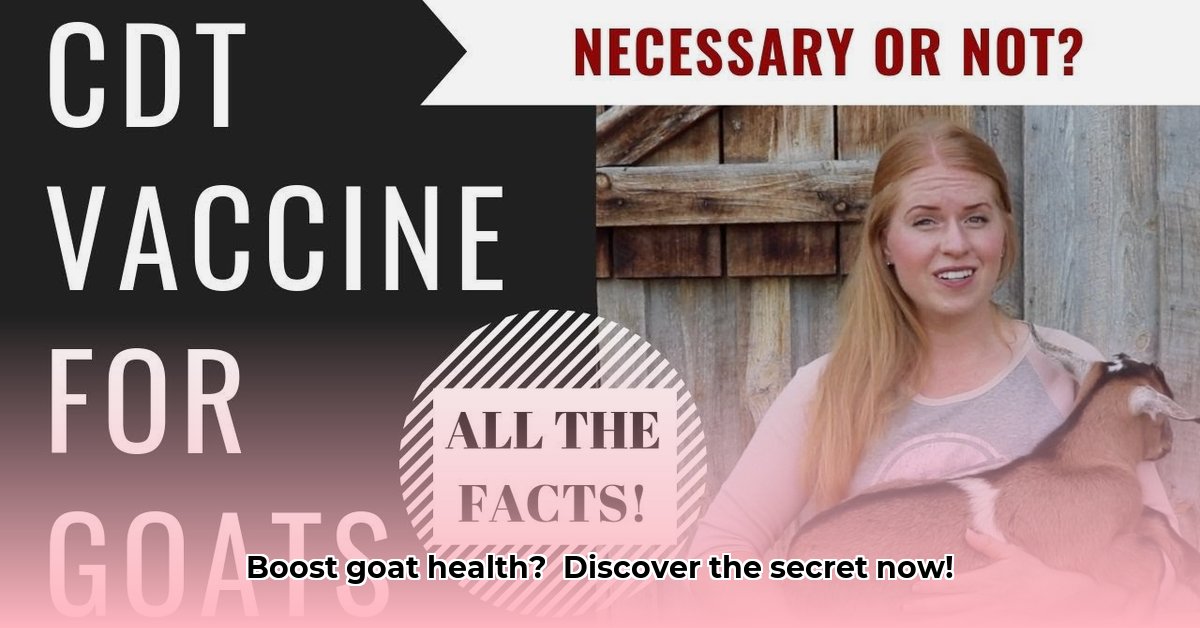
Keeping your goats healthy is crucial for a thriving farm. This guide shows you how to use the CDT vaccine, readily available at Tractor Supply, to protect your herd from common and potentially devastating diseases. We'll cover everything from understanding the vaccine to administering the injections, plus vital biosecurity measures. For other animal health products, check out Tractor Supply's online store.
Understanding the CDT Vaccine: Protecting Against Key Threats
The CDT vaccine protects against three significant goat diseases: Clostridium perfringens type C, Clostridium perfringens type D (often called "overeating disease"), and tetanus. These diseases, especially dangerous for younger goats, can severely impact your herd's health and productivity. Think of the CDT vaccine as essential insurance for your farm's bottom line. While precise efficacy data for the Tractor Supply brand may not be readily available, the widespread use of CDT vaccines underlines their importance in veterinary practice.
Why Vaccinate Your Goats? The Benefits are Clear
Vaccination isn't just a good idea—it's a smart investment in your farm's success. A proactive approach to goat health brings significant benefits:
- Increased Productivity: Healthy goats produce more milk and meat, boosting your farm's profitability. Isn't that a compelling reason to vaccinate?
- Reduced Veterinary Costs: Prevention is always cheaper than cure. Vaccination minimizes the risk of costly disease outbreaks and veterinary interventions.
- Improved Animal Welfare: Healthy goats are happier goats. Vaccination leads to a more content and productive herd.
Administering the CDT Vaccine: A Step-by-Step Guide
Always read the vaccine packaging instructions carefully before starting. Slight variations may exist between brands. This is a general guide and best practices:
Preparation: Ensure the vaccine is properly refrigerated until use. Gather clean needles and syringes. Choose a calm, safe space for administering the vaccine. If you're unsure, seek guidance from your veterinarian.
Injection Technique: CDT vaccines are typically administered subcutaneously (under the skin). Follow the dosage instructions precisely. Correct technique is vital for effectiveness and minimizes animal discomfort.
Record Keeping: Maintain a detailed vaccination log, noting the date, goats vaccinated, and vaccine lot number. This helps monitor herd health and is crucial for troubleshooting any issues.
Monitoring for Reactions: Observe your goats after vaccination for any unusual behavior or symptoms (lethargy, swelling). If you see anything concerning, contact your veterinarian immediately. A small investment in preventative care can save you a great deal in the long run, wouldn't you agree?
Sourcing Your CDT Vaccine: Convenient Access at Tractor Supply
Tractor Supply offers convenient access to the CDT vaccine, supplementing your other farm supply needs. However, always confirm availability before your visit. Your local veterinarian's office is another excellent source, offering personalized advice and potentially alternative brands tailored to your region's specific disease profile. Considering all of these factors helps you build a sustainable and highly effective vaccination strategy.
Biosecurity: A Holistic Approach to Herd Health
Vaccination is a key element of a comprehensive biosecurity plan. Combine it with these practices to maximize protection:
- Quarantine New Arrivals: Isolate new goats before introducing them to the main herd to prevent disease spread.
- Maintain Cleanliness: Keep housing and feeding areas clean and well-ventilated to minimize bacterial and parasite buildup. High sanitation standards are essential for optimal goat health.
- Regular Disinfection: Regularly disinfect equipment and facilities with appropriate livestock disinfectants. Proactive biosecurity strengthens your overall strategy.
Understanding Limitations and Seeking Professional Advice
While CDT vaccination is vital, remember that research continues to refine our understanding of vaccine efficacy. The absence of readily available, specific efficacy data for every brand emphasizes the importance of consulting your veterinarian. They can assess your herd's specific needs and offer tailored advice, considering your region's disease prevalence and other factors.
Budgeting for a Healthy Herd: Investing in the Future
Vaccination is an investment in your farm's long-term health and profitability. While there is an initial cost, the potential savings from avoiding costly disease outbreaks significantly outweigh this expense. The return on investment from preventative care is usually exceptionally high. Wouldn't you agree?
This guide offers essential information and practical steps but should not replace professional veterinary advice. Always consult your veterinarian for personalized guidance on vaccination schedules and best practices specific to your herd and region. They're your best resource for building a robust, sustainable health plan for your goats.